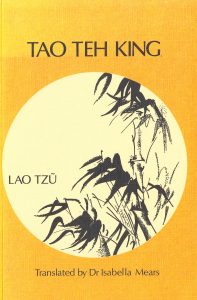TAO Teh King – A Tentative Translation from the Chinese
Door Lao Tse (601 BC - unknown), vertaald door Dr. Isabella Meers.
105 Pages | First edition 1922, 3rd reprint 1983 | Softcover | Theosophical Publishing House, Adyar | ISBN: 0722903006.
The name 'Lao Tsu' means 'old young', so that on the very threshold of our study we find a paradox, and we may call the wonderful teacher 'the old philosopher', 'the old child' or 'the young old man'. His family surname was Li. He wrote this book Tao Teh King, a book around which cluster much speculation and much literature in Chinese and other languages. The word 'King' we may leave out of count as it simply means classic, and was not given by Lao Tzu himself, but was added much later as a mark of respect.
From chapter XLVII (p. 67):
" Without going out of my door
I know the Universe
Without opening my window
I perceive Heavenly Tao
The more I go abroad, the less I understand
That is why the self-controlled man
arrives without going
names things without seeing them,
perfects without activity. "
 Bezig met bijwerken...
Bezig met bijwerken...